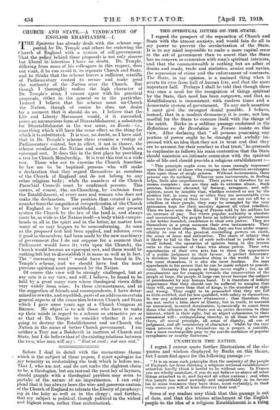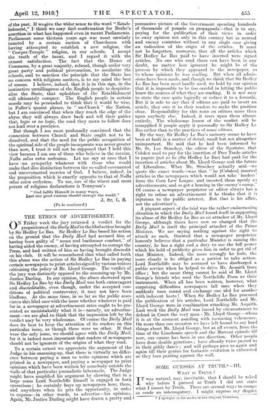THEltrhSPIEITIIAL DUTIES: ON
I regard .the prospect of the separation of .Church and State with- the- utmost ,anxiety,., and would-fain da all- in my power -to prevent the- secularization of the -State. It is to my mind- impossible to-makes more capital error in the- art- of government than to assest,that -the State has no concern oreonnexion with- man's spiritual interests; and- that the commonwealth- is nothing, but an •affair-, of drains-androads, trade and statistics, armies and navies, the repression-of clime and• the- enforcement- ot-contraets. The State, in my. opinion, is a. maimed thing when it averts its eyes from.half of human fate, and that the more important half: Perhaps I shall-be told that though there was..-onoe a need for the recognition of things.. spiritual by the State, that need has.beem.outgrown,,.and.that an Establishment is inconsistent. with: modern times and a democratic system of; government. To any such assertion I must give the strongest denial, possible.. I believe, instead, that in a, modern democracy: it is more; not loss, needful for the State: to• concern- itself: with the, things of the spirit. Barke.im a sublime passage: enshrined- in :the Reflections., on the Revolution in Prance- insists. on this view. After declaring that " all persons. possessing any portion of power ought to, be strongly and. awfully ire- pressed with an idea that they act in trust and that. they are to-aecountfor their conduit- in that treat?! heproeeeds to emphasimas followslis3 main.contention that the State should maintain amintimate•connexicur with the spiritual sido.of lif wand, should provide:a religious establishment :— " This principle ought even to be more strongly impressed upon the fain& of those who compose the collective-sovereignty than•upen those of single princes. Without. instruments, these princes can do nothing. Whoever. uses instruments, in finding helps, finds also impediments. Their. power is therefore by no means. complete ; nor are- they safe . in, extreme abuse.: Such persons, however: elevated. by flattery, arrogance, and, self, opinion, must be sensible that, whether covered or not by the positive law, in some way or. other. they are 'accountable even here for the abuse of their trust. If they are not cut off by a rebellion of their 'people, they may be. strangled by the very janissaries kept for their. security against. all: other rebellion, Thus. we have seen the King' ff France sold. by his soldiers for an increase of pay. But where popular. authority is absolute and unrestrained, the people have an infinitely greeter, because a far better founded;. confidence-in their •own,powen They are themselves in a great measure their own instruments. They are nearer to,their objects. Besides, they, are-less under respon. sibility to' one of ,.the. greatest controlling powers on earth, the sense of fame and estimation. Tho share of infamy that is likely to fall to the lot- of each. individual in public ante is small indeed, the operation of, opinion being iu the. inverse ratio to thee number of those whop abuse ,power. Their own approbation of their own acts. has to them the appearance of a public. judgment in their favour. A perfect democracy is therefore the most shameless thing- in the world: As it is the most shameless, it is also the most . fearless. No_ man apprehends in his:person that ho eon be made subject to punish, ment. Certainly• the people at large never ought; for,. as all punishments are for example towards the conservation of the people at large, the people at large can never become.thesubject of punishment by any human hand. It is. therefore.of infinite importance that they should, not be suffered to imagine that their will, any more than that of kings,- is the standard of sight and wrong. They ought to be peasuaded that they are full as little entitled, and far. less qualified, with safety to themselves, to use any arbitrary power • whateoevor ; that therefore they are. not, under •a false show of liberty, but in truth, to- exeraise an unnatural, inverted-domination, tyrannically to exact. from these who officiate-in the State not an, entire devotion to their interest, which is their right, but an abject submission to their orieesienal extinguishing thereby, in all those who servo them, all moral principle, all, sense of. dignity, all use of judgment, and all, consistency of character ; whilst by the very same process they give themselves up a proper, a suitable, but a most contemptible prey to the servile ambition of-popular syeophants• or courtly flatterera," UN-CHURCH THE.. NATION..
I regret I cannot..quote farther. illustration& of the• elo- quence. and .wisdom ,displayed by Burke on...thit, theme, but." must:find:space for, the following passage :— " It is..on some suoh•minciples that the majority, of the people of England: far. from, thinking areligious national establishment
:unlawful, hardly, think it lawful to, be without one, In France • you are.wholly mistaken, if you denot believe•us aboveall other things .attached to. it,. and. beyond .all • other, nations ; . and when this people tura acted unwisely and unjustifiably in its favour (as in some inatanceetliey have done, most certainly), in their very. errors you will, at least Aistover their zeal."
Some of my readers- may think that this. passage is out of. date, and that. this intense attachment of- the. English people- to the idea of a religious Establishment is a thing of the plat, If weigive the wider sense to the word " Estab- lialmient, ' I think we may find Tonfirmation for Burke's assertion in what has-happened even in recent Parliaments. Parliament some thirteen years..ago was most unwisely taunted by a certain section of Churchmen with having attempted to establish a new religion, the " Cowper-Temple " religion, in our schools. I accept the truth of the taunt, and I regard it with the utmost satisfaction. The fact that the Home of C0111101131:18, by a great-majority, refused, though under very great party and political provocation, to .seoularize the schools, and to sanction the principle that the State has no concern with religious matters, is to my mind the best of omens. I -believe, indeed, that it is in this sign, in the instinctive unwillingness of the English people to despiritu- alizc the State, that upholders of the Establishment will ultimately conquer. The English people in certain moods may be -persuaded to think that it would be wise, in Fuller's quaint phrase, to " im-Church " the Nation, but I am convinced that when they reach the edge of the abyss they will -always draw back and tell their guides that, logic or no logic, the road they mean to follow does not lead over a-precipice.
But though I am most profoundly convinced that the connexion between Church and State ought not to be dissolved, -and that the need for the public recognition of the spiritual side of the people incorporate was never greater than now, I trust it will not be supposed that I hold this view because I am one of those who believe in the maxim, Nana salus eslra eociesiam. Let me say at once that I have -no sympathy whatever with those who would make that dire distinction between the so-called covenanted and uncovenanted mercies of God. I believe, indeed, -in the proposition which is exactly opposite to that of NuRa talus extra ecclesiam. To me, one of the wisest and most potent of religious -declarations is Tennyson's " God fulfils Hisnself in many ways, Lest one good custom should corrupt the world."
(To be continued.)
J. ST. L. S.




































 Previous page
Previous page